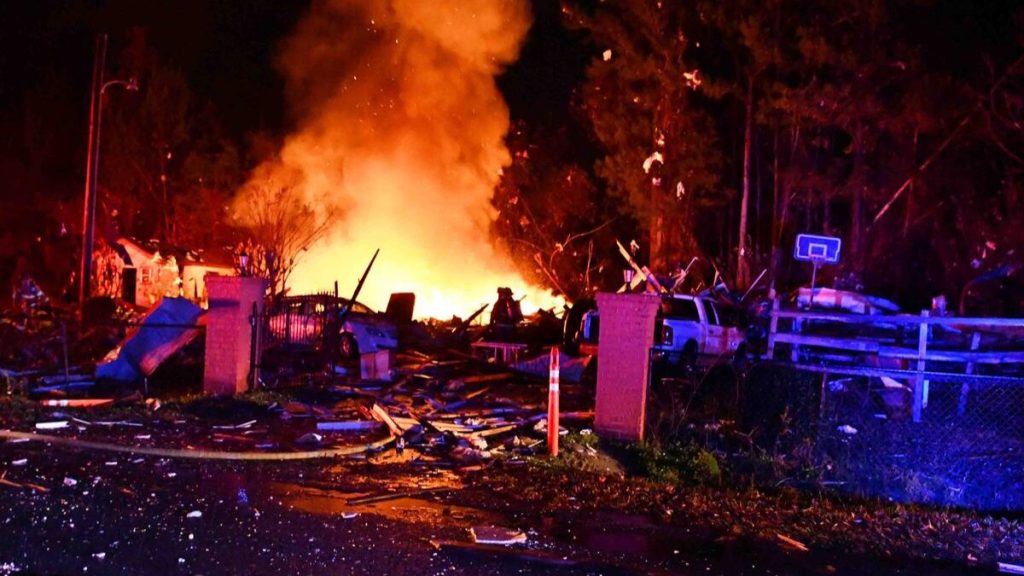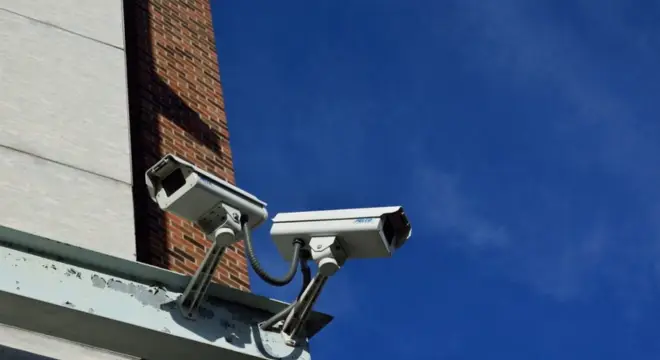New York House Blast Sparks Safety Concerns for Elderly Living Alone
I’m going to walk you through what actually happened on that quiet Monday morning in Lake View, New York—because if you’ve just seen the headlines, you probably still have questions.
At around 7:30 a.m. on May 13, 2025, an explosion ripped through a home on West Lane, killing 78-year-old Joene Pease and critically injuring her husband, John. According to police and eyewitnesses, the blast was so powerful that it shook neighboring homes and sent debris flying across the street. A nearby police officer, hearing the explosion, rushed in and pulled John out from under the rubble—likely saving his life.
First responders from over 20 local and state agencies were on scene within minutes. Smoke poured out of what was once a home, now just twisted wood and shattered memories. Photos show a completely leveled structure—nothing left standing.
And the most gut-wrenching part? This wasn’t some neglected, abandoned property. Joene and John were active, beloved members of their community. Joene had just attended Sunday church service. Less than 24 hours later, she was gone.
This isn’t just a news story—it’s someone’s real life, torn apart in seconds.
Let me ask you something:
If this happened in your neighborhood, would you be ready? Would you know what caused it, or how to respond?
We’ll dive into that soon. But first, let’s look at who Joene and John were—and why this hit so hard for the Lake View community.
Who Were the Victims?
Let’s stop for a moment and talk about the people behind this tragedy—because this wasn’t just about a house blowing up. It was about Joene and John Pease, a couple who had lived on West Lane for years, quietly building a life in their Lake View neighborhood.
Joene Pease was 78. If you ask anyone from Lake View Community Church, they’ll tell you she was “just the best.” Not loud. Not flashy. Just steady, kind, and always showing up for others. She was involved in her church, her community, and she never missed a Sunday service.
Her husband, John, survived—but barely. He was inside the house when the explosion happened. A police officer risked his own life pulling John from the wreckage before the house was completely engulfed in flames. John was taken to ECMC in critical condition, and as of the latest update, he’s still fighting for his life.
This part hits hardest for a lot of people—because it’s not just the sudden loss that stings. It’s that Joene and John were doing everything “right.” They weren’t reckless. They weren’t in some risky situation. They were home.
And that’s what makes it so terrifying.
Their neighbors have already started holding vigils. Local pastors are offering grief counseling. You can feel the weight of the loss in the way people talk about them—it’s not distant. It’s deeply personal.
If you’re reading this and thinking, “That could’ve been my parents… or my neighbors…”—you’re not alone.
We’re going to get into the causes and safety questions in a bit. But first, let me show you how first responders handled those first few chaotic moments after the blast.
How Did First Responders React?
When the explosion hit, there was no time to think—only act.
Within minutes, over 20 emergency units rushed to the scene. Firefighters, paramedics, local police, state investigators—everyone converged on West Lane as smoke poured into the sky and the house burned to the ground.
But the first real act of heroism happened before sirens even arrived.
A Town of Hamburg police officer, who happened to be nearby, ran toward the destroyed home without hesitation. He found John Pease trapped under debris—injured, disoriented, and seconds away from being overtaken by flames. That officer pulled him out. No protective gear. No backup. Just instinct and urgency. That move likely saved John’s life.
Once on-site, emergency crews worked fast. Not just to contain the fire, but to protect the surrounding homes, which had also been hit by shockwaves and flying debris. Some residents nearby reported shattered windows and cracked walls.
There were no other fatalities—but this wasn’t a small fire. It was a full-scale disaster response.
Several responders stayed through the day and into the night, securing the scene, helping investigators, and supporting neighbors who had to be temporarily relocated.
This section isn’t about glorifying anyone. It’s about acknowledging real courage—the kind we rarely see but always depend on.
Would your community be ready to react this fast?
That’s a question worth thinking about. Because in Lake View, readiness made all the difference between one casualty and something far worse.
What Caused the Explosion?

This is the part everyone’s asking: what actually caused the blast?
As of now, the exact cause is still unknown—but investigators are working around the clock. The Town of Hamburg Police Fire Investigation Unit is leading the case, with support from state fire experts. They’ve combed through what’s left of the home, but as you can imagine, a blast that levelled a house doesn’t leave many clear answers.
Here’s what we do know so far:
National Fuel—the company responsible for delivering natural gas to the home—released a public statement. As per WKBW, technicians inspected the supply lines and confirmed there were no gas leaks or operational issues on their end. This isn’t just company PR—they’re actively cooperating with investigators and have made their findings public.
This rules out the most common cause people assume in these situations: a gas leak from the utility line. But it doesn’t rule out everything. It could still be something inside the home—like an appliance malfunction, an aging pipe, or even human error.
Authorities have asked the public to be patient. And honestly, that makes sense. These types of investigations take time because they have to get it right. Rushing would risk either missing the real cause—or sparking unnecessary fear.
Kristen Mirand, a reporter for WKBW, posted updates on X, echoing the same message: there’s no confirmed cause yet, and the investigation is still very much active.
How Is the Community Coping?
When a tragedy hits a small town, it doesn’t just affect one family—it shakes everyone.
In Lake View, the impact of this explosion has been deeply personal. Joene and John Pease weren’t just names in a news report. They were part of the rhythm of local life—regulars at Lake View Community Church, the kind of neighbors who waved from the porch and remembered your birthday.
Just one day after the explosion, dozens of people gathered at the church for a prayer service. Friends, neighbors, and complete strangers came together—some crying, others just sitting quietly, trying to process what had happened. Local pastors offered words of comfort, but most of the healing came from simple togetherness.
One woman who attended the service told WKBW, “She was just the best. Always warm. Always kind. I still can’t believe it.”
Community members have also started organizing support efforts—meal trains, donation drives, and mental health resources for those especially affected. This wasn’t just a structural loss. It was emotional. It hit close to home.
On Facebook, local groups are filled with posts offering help—“If anyone needs a place to stay, message me,” or “I’m collecting blankets and clothes for displaced neighbors.” You can feel the unity in every comment.
News cycles move fast, but grief doesn’t. When we talk about the victims, we also need to talk about the community that surrounds them—and how, in moments like these, people often find strength in each other.
That strength is powerful. But it’s not a substitute for preparation.
Next, I’ll show you what steps you can take to protect your home and loved ones—because this could happen anywhere.
Privacy became a top priority for everyone just as Natalie Portman left Los Angeles behind for a quieter life in Paris, those affected by public disasters may seek similar peace.
How Can Such Tragedies Be Prevented?
If you’re like most people, your first thought after reading about an explosion like this is: “Could that happen in my home?”
The short answer is yes—if the right precautions aren’t in place. But the good news? A lot of these tragedies can be prevented with basic awareness and proactive maintenance.
Let’s start with the obvious one: gas safety. Even though National Fuel ruled out a utility-side gas leak in the Lake View explosion, gas leaks from inside the home—think stoves, water heaters, or old pipelines—are still a real risk. Experts recommend you:
- Install a natural gas detector (not just a smoke detector—this is different).
- Get your appliances and heating systems inspected annually by a licensed technician.
- Know the signs of a leak: rotten egg smell, hissing sounds, or dead vegetation near pipelines.
- Never ignore headaches or dizziness that worsen indoors—those could be early signs of carbon monoxide or gas exposure.
Also, make sure your home insurance covers explosion-related damage—many people don’t realize their policies don’t include it until it’s too late.
And here’s something most people don’t do, but should:
Create a family emergency plan. Know where the shut-off valves are. Make sure every adult in the house knows how to use a fire extinguisher. Practice exit routes—yes, like a fire drill, even if it feels silly.
According to the U.S. Fire Administration, residential explosions are rare but rising slightly due to aging infrastructure and increased use of gas-powered appliances.
This isn’t about living in fear—it’s about being smart.
So ask yourself right now:
When was the last time you checked your home for risks? Do you actually know what to do if you smell gas?
In the next section, I’ll walk you through similar incidents in New York and what we can learn from those patterns. Because this wasn’t a one-time thing—and that makes prevention even more urgent.
Are Home Explosions Common in New York?

It’s easy to think the Lake View blast was a one-off. A tragic, isolated incident. But if you start looking closely, you’ll see it’s not the only one.
Just last month, in West Hurley, New York, another home exploded—this time due to a propane leak. The house was destroyed. Thankfully, no one was killed, but it was a brutal reminder that these things do happen, and not just in big cities or old buildings.
Go back even further and you’ll find similar cases in Brooklyn, Dutchess County, and Suffolk County. Some caused by gas line failures, others by improper appliance setups or flammable materials stored near heat sources.
Here’s the pattern:
- Most explosions happen early in the morning or late at night—when people are either asleep or less alert.
- They often involve homes that haven’t had recent inspections.
- And in nearly every case, neighbors say they never saw it coming.
But here’s what’s missing from the headlines:
Very few of these stories dig into the preventive failures that led up to them. Was it outdated infrastructure? Missed inspections? Poor regulation enforcement? The coverage tends to stop at “what happened,” not “why it keeps happening.”
That’s a gap we need to talk about more.
Because while it’s easy to chalk this up to bad luck, most of these incidents leave clues beforehand—smells, noises, signs of system strain. The problem is, people either don’t know what to look for… or they ignore it.
In the next section, I’ll give you actual resources—places people can turn to for help, answers, and support when disasters like this hit home.
Where Can Victims and Families Seek Help?
When a tragedy like this strikes, the emotional and financial toll can be overwhelming. The news fades, but for the people living through it, life doesn’t just “go back to normal.” That’s why knowing where to turn for support is just as important as knowing what happened.
For families like the Peases—or anyone affected by similar disasters—here are trusted resources that offer real help:
Emergency Relief & Housing Support
- American Red Cross – Western New York Chapter: Offers temporary housing, emergency supplies, and emotional support after home disasters.
- Website: redcross.org/local/new-york/western-new-york.html
- New York State Office of Emergency Management (OEM): Helps coordinate disaster response and victim assistance programs.
- Website: dhses.ny.gov/oem
Mental Health & Trauma Counseling
- Erie County Crisis Services
24/7 mental health support, grief counseling, and trauma response teams.
Crisis Line: (716) 834-3131 - SAMHSA Disaster Distress Helpline
A national resource for anyone emotionally impacted by disasters.
Call or Text: 1-800-985-5990
Financial Assistance & Legal Aid
- FEMA – Individual Disaster Assistance
May cover temporary housing, property damage, and other essentials (depending on declaration status).
Website: disasterassistance.gov - Legal Aid Bureau of Buffalo
Free legal guidance for displaced or low-income residents after emergencies.
Website: legalaidbuffalo.org
Local Community Support
- Lake View Community Church & Outreach Programs
- Hosting prayer services, organizing donation drives, and providing spiritual care for anyone grieving.
- (Specific contacts can be sourced through local Facebook groups or church bulletin boards)
When the headlines fade, people still need food, shelter, support, and someone to talk to. Including this section isn’t just helpful—it’s necessary. Because behind every “news story” are real families trying to figure out what happens next.
And maybe, if you’re not directly affected, this is where you come in—by donating, volunteering, or just reaching out to someone who might need a hand.
Coming up next, I’ll walk you through visuals and documentation that show the scale of what happened—because sometimes, pictures say what words can’t.
Visuals from the Scene
Sometimes, words don’t hit as hard as images do. And in the case of the Lake View home explosion, the visuals speak volumes.
Photos taken just minutes after the blast show what used to be the Pease home reduced to splintered wood, smoking debris, and exposed concrete. Not a single wall left standing. What’s most haunting is how fast it all happened—one moment, a quiet home in a peaceful neighborhood… the next, total devastation.
Drone footage from local news outlets like WGRZ and WKBW captures the scene from above. You can clearly see how close the debris came to nearby homes—proof of how wide the blast radius was. In several frames, insulation and window glass are scattered across lawns three houses down.
Local reporters on scene wore masks to protect themselves from dust and gas particles still lingering in the air. Fire crews worked for hours, spraying down hotspots and keeping onlookers at a distance.
What’s especially powerful are the community images—candles lined up on the church steps, neighbors hugging, a prayer card with Joene Pease’s name on it lying beside a bouquet.
And it’s not about shock value. It’s about truth.
These visuals do something words can’t:
They make the danger real. They make the loss visible. And they make you stop and think, “What if that was my street?”
Conclusion
There’s a moment after every tragedy when the noise fades—no more sirens, no more flashing headlines—and you’re left with the quiet question: Now what?
The explosion in Lake View wasn’t just an accident. It was a wake-up call.
Joene Pease didn’t wake up that morning expecting it to be her last. Her husband didn’t know he’d be pulled from the rubble of the home they built together. Their neighbors didn’t expect their peaceful street to turn into a disaster zone before breakfast.
And that’s exactly why we need to talk about it.
Because when we move too quickly past these stories, we lose the lessons they offer. We forget that behind every headline is a family. A neighborhood. A moment that changed everything.
So here’s what I hope you take from this:
- Know your risks. Get your gas lines checked. Install a detector. Talk to your family about what to do in an emergency.
- Check in on your community. Is there an elderly couple on your street who might not notice a leak? Are there kids home alone after school? Awareness isn’t just personal—it’s collective.
- Honor the lives affected. Don’t let Joene and John’s story be another forgotten tragedy. Let it be the reason someone else is safer tomorrow.
And if this hit home for you, I want to hear from you.
Have you ever dealt with a home safety scare? Do you feel prepared if something like this happened on your street?
Share your thoughts. Share your questions. Share this story with someone who might need the reminder.
Because moving forward means paying attention—and choosing to care.
Disclaimer: This article is based on publicly available information. Investigation details may change as new updates emerge. Readers should refer to official sources for the most current and verified information.


